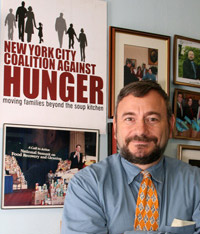The United States is the world’s wealthiest nation, yet we still have families and children who don’t have enough to eat. We caught up with Joel Berg of NYC’s Coalition Against Hunger to learn what it means to be food insecure and what we can do to ensure that no child goes to bed hungry.
Theresa Riley: What does it mean to be “food insecure”? How many American children now live in “food insecure” households?
Joel Berg: Food insecure means families don’t have enough money to regularly obtain all the food they need. It means they are rationing food and skipping meals. It means parents are going without food to feed their children. It means kids are missing breakfasts. And, ironically, because healthy food is usually more expensive than junk food, and because healthier options often don’t even exist in low-income neighborhoods, it means that food insecurity and obesity are flip sides of the same malnutrition coin, so food insecurity may actually increase a family’s chance of facing obesity and diabetes. Fifty million Americans, including nearly 17 million children, now live in food insecure homes.
Riley: What are some of the consequences for children who go to bed hungry and malnourished?

A student serves up desert to classmates during lunch at the People for People Charter School, Monday, Feb. 25, 2013, in Philadelphia.
Berg: In general, because America does have a federal safety net of SNAP (formerly called Food Stamps) and the National School Lunch Program, which benefit tens of millions of low-income Americans, Americans rarely starve to death the way people do in some developing countries. Yet the levels of food insecurity and food rationing we have in America still have dire consequences for the people who suffer from it – and for the nation as a whole.
Hunger in the world’s wealthiest nation is not only morally unacceptable, it also costs the U.S. economy at least $167.5 billion per year, in large part because of its negative impact on children, according to the Center for American Progress.
Food insecure children experience a broad range of problems that affect their health, development, well-being and school performance. Poorly nourished children have lower school test scores and require far more long-term health care spending. Hunger also reduces the productivity of workers, which reduces their earnings, which, in turn, reduces their ability to purchase nutritious food for their children. In this vicious cycle, malnourished children do not do as well in school, are more likely to drop out, and are less likely to go to college than children who are properly nourished. Consequently, malnourished children earn less as adults and are less able to help America build a 21st-century high-skills economy. In order for the nation to build the best public education system in the world, bring down health care costs, and rebuild our economy, we simply must end hunger.
Riley: What is the best way to reduce hunger among working families?
Berg: The president and Congress need to work to fundamentally change U.S. economic polices to focus not just on creating wealth on Wall Street, but also on creating living wage jobs across the nation. Congress should also agree to the president’s plan to raise the minimum wage to nine dollars and hour, and then index that to inflation.
Additionally, both parties should expand the earned income tax credit that aids low-income working families and combine all federal nutrition assistance programs into one program, with one application, and raise the eligibility to twice the poverty line, to ensure that more working families are able to benefit from SNAP and school meals.
Riley: You recently wrote a report that advised President Obama how he could reverse America’s worsening hunger metrics. There were a lot of recommendations about executive orders in it. Why was that? Does Congress lack innovative ideas for dealing with hunger?
Berg: The sad reality is that the only so-called hunger ideas coming out of the House majority these days would actually increase hunger by slashing funding for effective programs. Their claim that they are fighting poverty by taking away funding from poverty programs makes as much sense as someone claiming they are fighting drought by taking away water.
There used to be strong bi-partisan support for federal efforts to fight hunger. President Richard Nixon and Senator Bob Dole played historic roles in building the federal safety net. Unfortunately, the modern Republican Party, especially in the House of Representatives, has turned its back on that tradition. A few years ago, a very modest bill to improve school meals, which actually paid for the school meals improvements by slashing SNAP, and didn’t cost the American people an extra penny, passed the U.S. Senate unanimously. But the vast majority of House Republicans voted against it. Even those that claim to be “pro-life,” voted to slash the WIC program, which provides nutrition assistance to pregnant women and their infants.
I hope that someday soon the American people will elect a House majority that is serious about ending, rather than increasing, hunger. Until then, I am afraid the best hopes for significant progress now rests with the White House. Yet even this White House needs to be pushed on this issue, and I hope the American people do push.
Riley: Will sequestration have any impact on the WIC program that feeds children, infants and pregnant mothers?
Berg: Most of the WIC funding was quietly restored by a more recent budget vote. But the sequestration is still slashing funds to soup kitchens, food banks, food pantries, and homelessness prevention efforts. A truly appalling exercise in gutlessness all around.
Riley: The number of students participating in school lunch programs has risen significantly in recent years. With summer just around the corner, where can children go for a nourishing meal?
Berg: There is a federal program that funds meals for low-income children over the summer called the Summer Food Service Program. Many sites for these meals are at parks, recreation centers and summer education programs, but as cities and states cut back on their spending – often in response to federal cut-backs – they reduce these summer programs and thus reduce summer meals sites. It is no wonder then, according to the Food Research and Action Center, that in 2011 only one in seven children who received school lunch received summer meals.
Riley: What can people do to help others who are hungry in their local communities?
Berg: People can sign our online pledge to ask the president and Congress to enact the president’s pledge to end U.S. child hunger by 2015. They can also inform themselves by seeing the new documentary on hunger in America, A Place at the Table, in which I have role. Lastly, to find out how they can most effectively volunteer, they can utilize our comprehensive online resources at www.hungervolunteer.org. Every American can – and should – make a difference.
Joel Berg leads the New York City Coalition Against Hunger, which represents the more than 1,200 nonprofit soup kitchens and food pantries in New York City and the more than 1.5 million low-income New Yorkers who are food insecure. He is a Senior Fellow at the Center For American Progress and the author of the book All You Can Eat: How Hungry is America?


